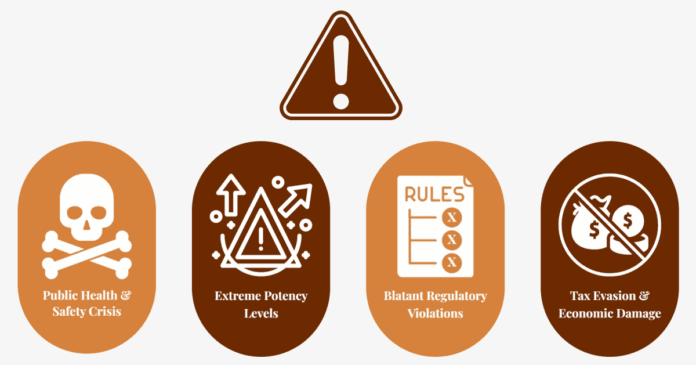Analysis of 104 products marketed as hemp in California from 68 brands finds broad use of synthetic cannabinoids, very high potencies and tax evasion.
In September last year, emergency regulations were approved by the California Office of Administrative Law requiring hemp products intended for human consumption have no detectable THC per serving. Going back further to 2021, regulations were introduced stipulating hemp products must not include cannabinoids produced through chemical synthesis.
But it appears these rules continue to be widely ignored, even in the face of raids associated with a crackdown.
The analysis, a project of the San Diego/Imperial Counties Joint Labor Management Cannabis Committee, found:
- 95% of the products tested revealed the presence of prohibited “synthetic”* cannabinoids.
- 91% exceeded federal hemp THC limits of less than 0.3% dry weight.
- 88% were sold without sales and use tax.
- 56% failed California hemp standards.
- Nearly half contained synthetically derived tetrahydrocannabiphorol (THCP), which is far more potent than naturally occurring delta-9 THC.
- The most common chemically “synthesized” cannabinoid was delta-8 THC, detected in 86 percent of all products.
While this study did not examine pesticide, solvent, or heavy metal contaminant levels, another investigation last year reportedly found out of 42 legal cannabis products tested (not necessarily “hemp”), 25 had pesticide concentrations above allowed levels, and contaminants including chemicals linked to cancer and other health issues.
“Beyond the public health concerns, these unregulated products are undermining California’s legal cannabis industry and evading taxes,” says a white paper recently released by the Committee titled “The Great Hemp Hoax“.
The issues are not confined to lesser-known or rogue operators state the authors, but some well-established brands are involved too.
“The widespread availability of intoxicating hemp products, including from brands with mainstream credibility, suggests that our findings reflect broader market trends rather than an anomaly caused by selection bias alone.”
California’s emergency regulations expire next month and their re-authorization is essential state the authors, who also urged legislative action ensuring all intoxicating cannabinoid products are subject to robust regulatory oversight and stronger enforcement; particularly in relation to online retailers not playing by the rules.
* The term synthetic has been a matter of ongoing debate, with some claiming delta-8 THC – created by manipulating cannabidiol (CBD) – is not synthetic.


